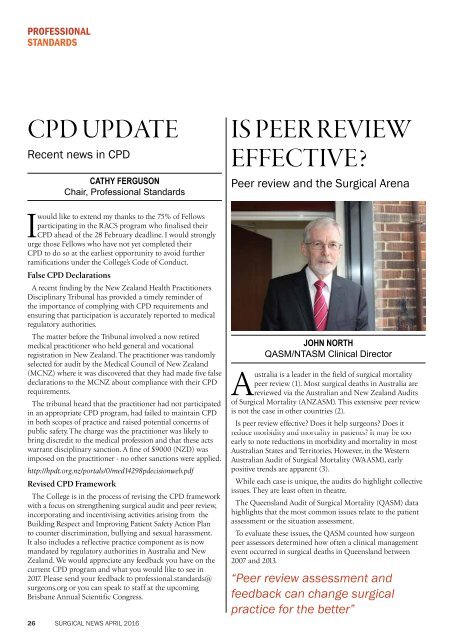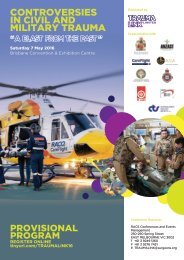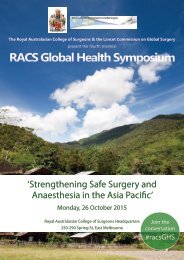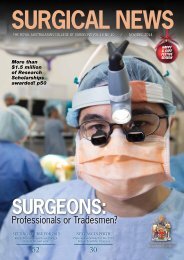You also want an ePaper? Increase the reach of your titles
YUMPU automatically turns print PDFs into web optimized ePapers that Google loves.
PROFESSIONAL<br />
STANDARDS<br />
AUDITS OF<br />
<strong>SURGICAL</strong> MORTALITY<br />
CPD UPDATE<br />
Recent news in CPD<br />
CATHY FERGUSON<br />
Chair, Professional Standards<br />
I<br />
would like to extend my thanks to the 75% of Fellows<br />
participating in the RACS program who finalised their<br />
CPD ahead of the 28 February deadline. I would strongly<br />
urge those Fellows who have not yet completed their<br />
CPD to do so at the earliest opportunity to avoid further<br />
ramifications under the College’s Code of Conduct.<br />
False CPD Declarations<br />
A recent finding by the New Zealand Health Practitioners<br />
Disciplinary Tribunal has provided a timely reminder of<br />
the importance of complying with CPD requirements and<br />
ensuring that participation is accurately reported to medical<br />
regulatory authorities.<br />
The matter before the Tribunal involved a now retired<br />
medical practitioner who held general and vocational<br />
registration in New Zealand. The practitioner was randomly<br />
selected for audit by the Medical Council of New Zealand<br />
(MCNZ) where it was discovered that they had made five false<br />
declarations to the MCNZ about compliance with their CPD<br />
requirements.<br />
The tribunal heard that the practitioner had not participated<br />
in an appropriate CPD program, had failed to maintain CPD<br />
in both scopes of practice and raised potential concerns of<br />
public safety. The charge was the practitioner was likely to<br />
bring discredit to the medical profession and that these acts<br />
warrant disciplinary sanction. A fine of $9000 (NZD) was<br />
imposed on the practitioner - no other sanctions were applied.<br />
http://hpdt.org.nz/portals/0/med14298pdecisionweb.pdf<br />
Revised CPD Framework<br />
The College is in the process of revising the CPD framework<br />
with a focus on strengthening surgical audit and peer review,<br />
incorporating and incentivising activities arising from the<br />
Building Respect and Improving Patient Safety Action Plan<br />
to counter discrimination, bullying and sexual harassment.<br />
It also includes a reflective practice component as is now<br />
mandated by regulatory authorities in Australia and New<br />
Zealand. We would appreciate any feedback you have on the<br />
current CPD program and what you would like to see in<br />
2017. Please send your feedback to professional.standards@<br />
surgeons.org or you can speak to staff at the upcoming<br />
Brisbane Annual Scientific Congress.<br />
IS PEER REVIEW<br />
EFFECTIVE?<br />
Peer review and the Surgical Arena<br />
JOHN NORTH<br />
QASM/NTASM Clinical Director<br />
Australia is a leader in the field of surgical mortality<br />
peer review (1). Most surgical deaths in Australia are<br />
reviewed via the Australian and New Zealand Audits<br />
of Surgical Mortality (ANZASM). This extensive peer review<br />
is not the case in other countries (2).<br />
Is peer review effective? Does it help surgeons? Does it<br />
reduce morbidity and mortality in patients? It may be too<br />
early to note reductions in morbidity and mortality in most<br />
Australian States and Territories. However, in the Western<br />
Australian Audit of Surgical Mortality (WAASM), early<br />
positive trends are apparent (3).<br />
While each case is unique, the audits do highlight collective<br />
issues. They are least often in theatre.<br />
The Queensland Audit of Surgical Mortality (QASM) data<br />
highlights that the most common issues relate to the patient<br />
assessment or the situation assessment.<br />
To evaluate these issues, the QASM counted how surgeon<br />
peer assessors determined how often a clinical management<br />
event occurred in surgical deaths in Queensland between<br />
2007 and 2013.<br />
“Peer review assessment and<br />
feedback can change surgical<br />
practice for the better”<br />
The QASM then looked at all the cases which fulfilled the<br />
inclusion criteria of the audit, of which there were 4,816. The<br />
cases were then counted and classified by the most serious<br />
clinical event, if there was one, for each patient.<br />
Encouragingly, 70.7% (3,406/4,816) of patients who died had<br />
no clinical management events. When patients did have an<br />
‘event’ (1,410), 58% (688/1,186) of those events were assessed<br />
as being preventable.<br />
The three most frequent groups of ‘serious clinical events’<br />
were:<br />
• problems in patient assessment (34.5%; 487/1,410) of<br />
events<br />
• problems in suboptimal therapy (15.3%; 215/1,410) of<br />
events and<br />
• delays in various stages of the patient care pathway<br />
(15.1%; 213/1,410) of events.<br />
The specific preventable issues most commonly noted were:<br />
• the decision to operate<br />
• should have performed different operation<br />
• delay in diagnosis<br />
Peer review, as seen in this audit, significantly contributes to<br />
the recognition of management ‘clinical events’. It also allows<br />
comment on the ‘preventability’ of these events.<br />
The feedback from the peer reviewer to their colleague<br />
surgeon then closes the loop of the quality assurance process.<br />
References:<br />
1. Raju RS, Guy GS, Majid AJ, Babidge W, Maddern GJ. The<br />
Australian and New Zealand Audit of Surgical Mortality-Birth,<br />
Deaths, and Carriage. Ann Surg. 2014;261(2):304-8. DOI:<br />
10.1097/sla.0000000000000581.<br />
2. Vyas D, Hozain AE. Clinical peer review in the United States:<br />
History, legal development and subsequent abuse. World Journal<br />
of Gastroenterology 2014;20(21):6357-63. DOI: 10.3748/wjg.<br />
v20.i21.6357. URL: http://www.ncbi.nlm.nih.gov/pmc/articles/<br />
PMC4047321/<br />
3. Azzam DG, Neo CA, Itotoh FE, Aitken RJ. The Western Australian<br />
Audit of Surgical Mortality: outcomes from the first 10 years.<br />
MJA. 2013;199(8):539-42. DOI: 10.5694/mja13.10256. URL:<br />
https://www.mja.com.au/system/files/issues/199_08_211013/<br />
azz10256_fm.pdf<br />
26 <strong>SURGICAL</strong> <strong>NEWS</strong> APRIL 2016 <strong>SURGICAL</strong> <strong>NEWS</strong> APRIL 2016 27






